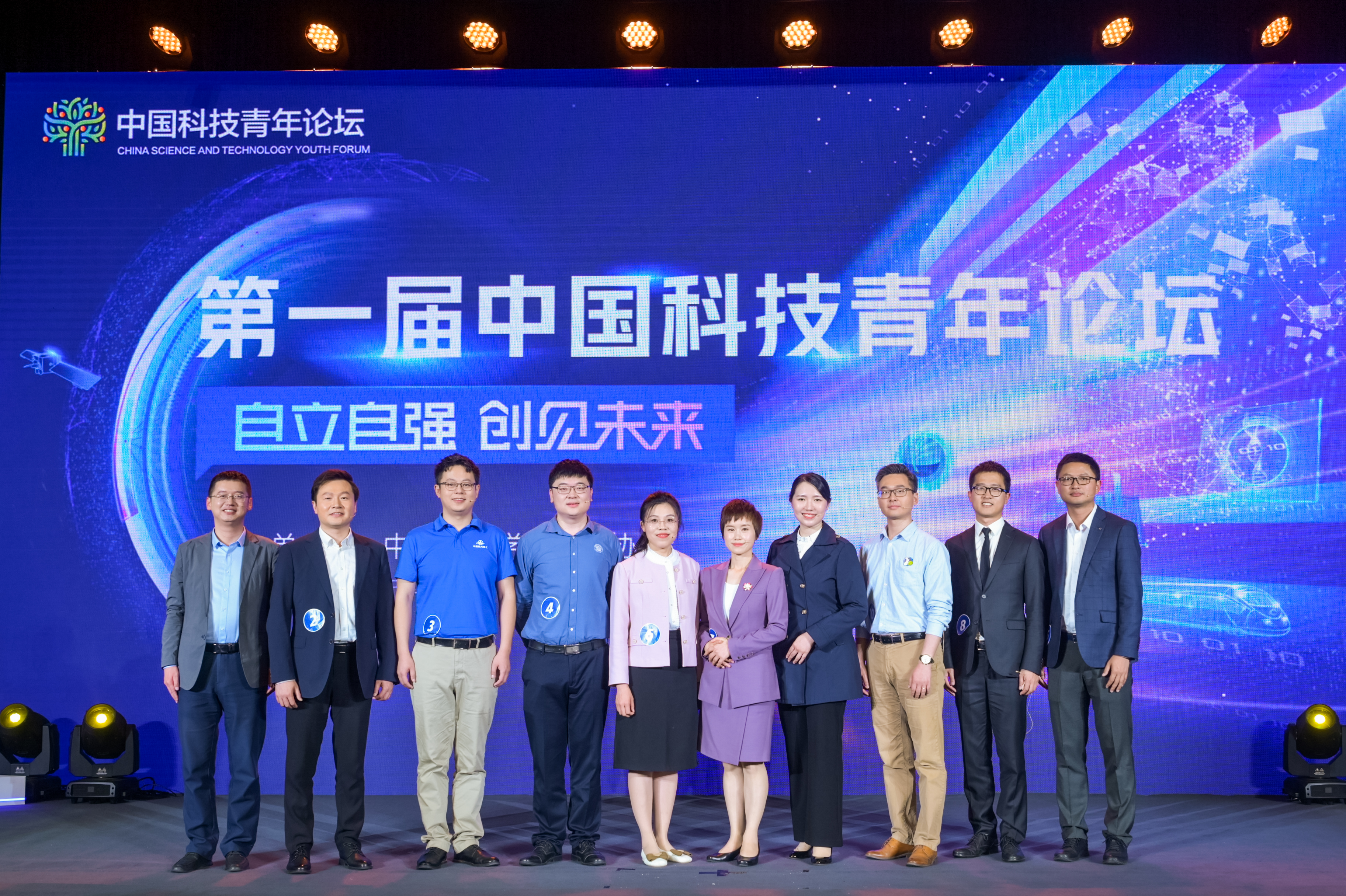By?LI?Linxu
As part of efforts to promote sci-tech innovation, the summit forum of the First China Science and Technology Youth Forum was held on May 8 in Beijing.
The forum showcased young researchers' achievements and vitality, said Wan Gang, president of the China Association for Science and Technology (CAST), noting that it has attracted nearly 3,000 young talent to participate.
Striving for excellence
Standing out from previous sub-forums, ten speakers exerted their best to charm the expert panel and audiences to win awards in the summit forum.

The group photo of ten speakers at the summit forum of the First China Science and?Technology Youth Forum. (PHOTO: CAST)
The award of Rising Star in Science and Technology went to Wu Xiaojun, professor of the School of Electronics and Information Engineering, Beihang University. Themed with "Love What I Choose, Choose What I Love," she shared her R&D story of generating high energy terahertz radiation from lithium niobate crystals.
This is an unforgettable experience, said Wu, adding that along with preparing for and participating in the forum, she created another world record — the generation of 13.9-mJ terahertz radiation.
The award of Best Suggestions went to You Weiwei, professor of the College of Ocean & Earth Sciences, Xiamen University.
Focusing on germplasm innovation, he shared his 20 years' research story of abalone breeding.
The forum provides a great platform for young researchers, said You, adding that although we come from different sectors, we soon get along well with each other.
The Best Style award-winner Qin Ning, chief engineer of the Shengli Oilfield Geophysical Research Institute under Sinopec, said that the forum provides a unique opportunity for young researchers to exchange with each other, which will facilitate interdisciplinary integration.
She shared her story as a female researcher. Through tireless efforts, she and her team have developed high-precision imaging software modules with independent IPR.
The Best Popularity award-winner Lv Longwei, associate professor and associate chief physician of the Peking University School and Hospital of Stomatology, said she learned a lot from fellow young researchers, and received valuable feedbacks from expert panel.
With unremitting endeavors, she has tackled a number of bottleneck problems in the field of regenerative medicine.
Challenging but rewarding
Challenging but rewarding are well demonstrated in all of the speakers' R&D road.
R&D in aerospace is indeed challenging, said Zang Jinliang, research fellow of the China Aerospace Science and Industry Corp., adding that fortunately, we have a great team and the older experts always give a helping hand.
Hou Suqing, associate research fellow of the Institute of Modern Physics, Chinese Academy of Sciences, also said that doing basic research is challenging in many ways, including mental stress and paper setbacks, but he found strength and learned a lot from the scientists of older generation.
Zhong Xing, chief engineer of Chang Guang Satellite Technology Co., Ltd., said that though challenging, the R&D road is also rewarding. Now his R&D achievements have been applied at home and abroad.
Liu Jinglei, deputy director of the Network and IT Technology Research Institute under China Mobile Research Institute, shared his story of tackling computing bottlenecks. In the process, he encountered setbacks, had thoughts of giving up, but eventually rekindled confidence, and got over bottlenecks.
In the field of brain inspired computing research, interdisciplinary exchanges are difficult but in great needs, said Li Huanglong, associate professor of the Department of Precision Instruments, Tsinghua University.
To tackle research bottlenecks, bold thinking and careful verification are both needed, said Tang Minggang, researcher from the China Ship Scientific Research Center, while sharing his technological innovation road in the R&D of marine equipment.
From ocean to universe, the ten speakers presented their stories very well. Through them, we can see the young researchers are shouldering more responsibility and demonstrating good qualities in R&D, said Ye Peijian, academician of the Chinese Academy of Sciences, also member of expert panel, while making comments on the speakers' presentations.
The event, hosted by CAST, is one of a series of activities to implement the spirit of the 20th CPC National Congress, which vowed to cultivate greater numbers of young scientists.
The trio will conduct a series of experiments in fields such as life science, fluid physics, combustion science and materials science. Notably, this is the first time that fruit flies have been taken on a Chinese space mission as experimental subjects. What made scientists choose fruit flies? What experiment will they undergo?
